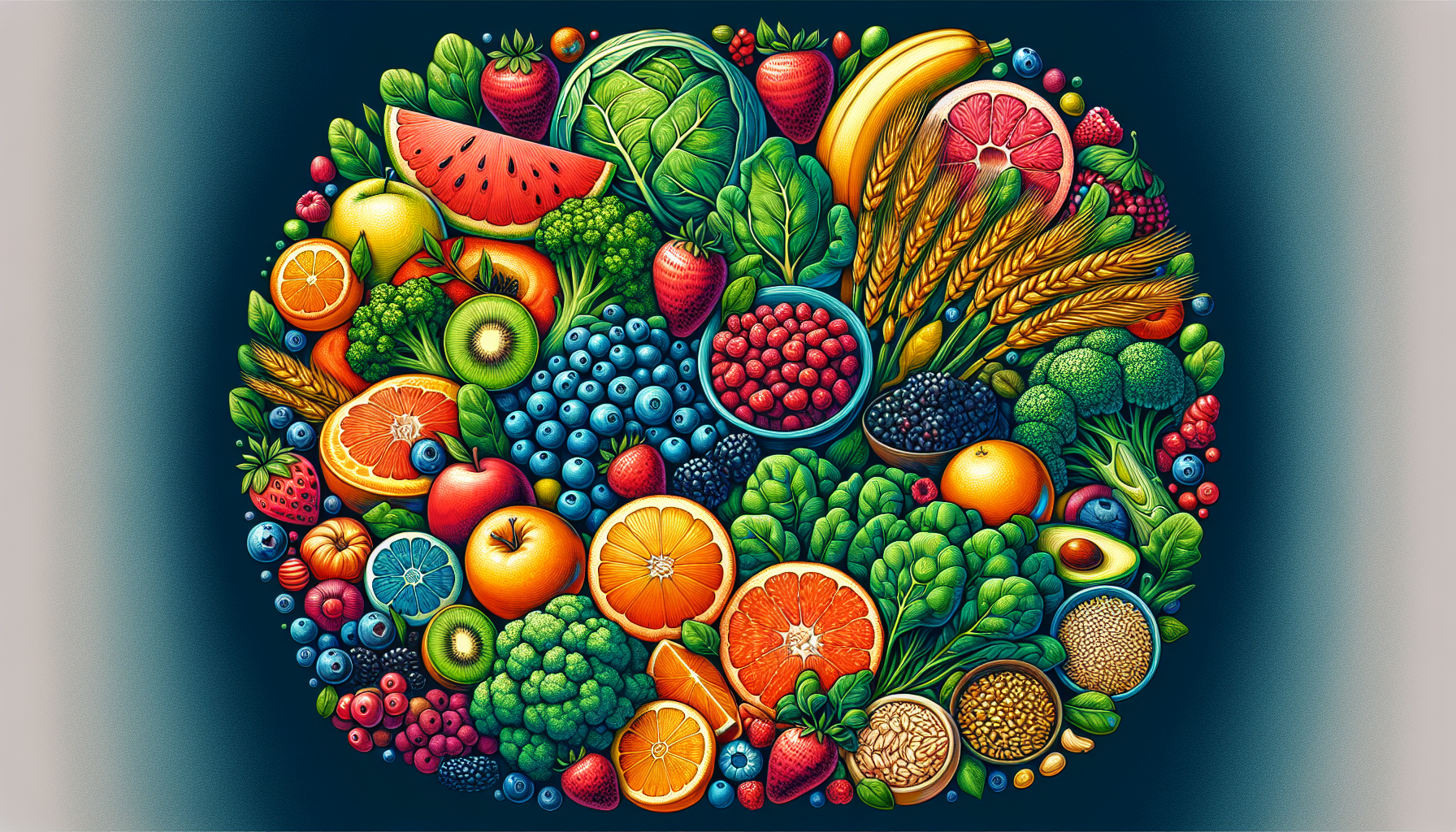Maintaining healthy eyes and protecting your vision doesn't have to be complicated. While a balanced diet rich in essential vitamins and minerals is foundational, certain nutritional supplements can provide an extra boost, especially as we age. With many options on the market, knowing what to look for can significantly promote eye health. In this article, we dive into the best supplement for eyes, drawing on insights from the latest research to help you navigate the clutter. From vitamin C and omega-3 fatty acids to the powerful antioxidant properties of lutein and zeaxanthin, we cover everything you need to know to make an informed decision.
The Age-Related Eye Disease Studies (AREDS and AREDS2) conducted by the National Eye Institute have provided substantial evidence of the benefits of specific supplements in reducing the risk of age-related macular degeneration (AMD) and other eye diseases. These studies emphasize the role of high doses of antioxidants and the addition of lutein and zeaxanthin in slowing the progression of advanced AMD. However, it’s crucial to understand that while these supplements can be beneficial, their effectiveness depends on factors like bioavailability and individual health conditions. Consulting with your primary care doctor or an eye doctor is essential to tailor the proper eye health supplement regimen for you, ensuring safety and maximizing benefits.
Key Takeaways
- A balanced diet rich in vitamins A, C, E, and D, minerals like zinc, and Omega-3 fatty acids is crucial for maintaining eye health. Still, aging individuals may benefit from supplemental forms of these nutrients to prevent or delay eye diseases.
- The Age-Related Eye Disease Studies (AREDS and AREDS2) highlight the importance of specific supplements in reducing the risk of advanced age-related macular degeneration and vision loss, particularly high doses of antioxidants and the addition of lutein and zeaxanthin.
- While eye health supplements can be beneficial, it is essential to consider bioavailability, potential side effects, and personal health needs. Consultation with a healthcare provider is advised before beginning a supplement regimen to ensure safety and compatibility.
Unlocking the Power of Nutrients for Your Vision

Every blink, every tear, every ray of light that hits your eyes involves a complex process of cells and tissues working in harmony. This harmony is orchestrated by a host of vitamins, minerals, and other nutrients working behind the scenes. From the vibrant Vitamin A to the zesty zinc, these nutrients help delay or prevent eye problems and diseases and optimize visual performance. Some essential nutrients for eye health include:
- Vitamin A
- Vitamin C
- Vitamin E
- Zinc
- Omega-3 fatty acids
- Lutein and zeaxanthin
By incorporating these nutrients into your diet, you can support the health of your eyes and maintain optimal visual function.
Eye health greatly benefits from a healthy diet, notably one abundant in carotenoids found in colored fruits and vegetables. But as we age, our bodies may not absorb nutrients as efficiently as they once did. This is where supplements step in, providing a concentrated dose of these essential nutrients and significantly benefiting individuals older than 55 prone to age-related eye diseases. Some supplements that are beneficial for eye health include:
- Vitamin C
- Vitamin E
- Zinc
- Omega-3 fatty acids
- Lutein and zeaxanthin
Adding these supplements to your daily routine can help support and maintain your eye health. For a deeper dive into lutein and zeaxanthin, check out our article “Nature's Eye-essential: The Five Best Lutein Supplements to Elevate Your Well-being.” This article explores five of the top lutein/zeaxanthin products. The Bausch & Lomb product from this list contains vitamins E and C plus zinc. If you are interested in eye health supplements, this curated list can boost your search. Read more here.👇
Essential Vitamins for Eye Health
Maintaining eye health depends on various vitamins, each with its unique role. Some essential vitamins for eye health include:
- Vitamin A is crucial for the retina's health and benefits the cornea. Foods like sweet potatoes are rich in Vitamin A.
- Vitamin C helps protect the eyes from damage caused by free radicals. Citrus fruits, strawberries, and bell peppers are good sources of Vitamin C.
- Vitamin E helps protect the eyes from oxidative stress. Nuts, seeds, and spinach are good sources of Vitamin E.
- Vitamin D plays a role in reducing the risk of macular degeneration. Fatty fish, fortified dairy products, and sunlight exposure are good sources of Vitamin D.
Including these vitamins in your diet can help promote eye health and support your overall eye health.
Vitamin C isn’t just your immune system’s best friend; it’s also an antioxidant that contributes to tissue repair and growth. It’s associated with a lower occurrence of cataracts and slowing the progression of age-related macular degeneration. So, remember you're also nourishing your eyes the next time you reach for that orange.
Critical Minerals for Visual Acuity
Although vitamins often garner the most attention, minerals also hold a significant role in maintaining eye health. Take zinc, for example. It’s concentrated in the retina and is pivotal in retinal health and protection against macular degeneration.
Zinc is integral for transporting vitamin A from the liver to the retina and for producing melanin, which safeguards the eyes. The good news is that dietary sources of zinc are plentiful, including beans, oysters, poultry, and other foods, allowing for its consumption through a balanced diet.
Omega 3s: The Vision Enhancers

The value of Omega-3 fatty acids extends beyond heart health. They are particularly beneficial for the eyes, especially DHA, and are critical for developing retinal cells. In addition to their other benefits, Omega-3 fatty acids aid in reducing inflammation and foster the healing and regeneration of retinal and corneal cells.
Regular intake of Omega-3 fatty acids from cold-water fish like salmon and tuna has been associated with a decreased risk of developing eye diseases and improved tear function. So, the next time you plan a meal, remember that serving fish not only satiates your palate but also contributes to optimal eye health.
Knowing how vital Omega-3s are for the eyes, we can’t leave our vegan and vegetarian friends without options. Check out our article “From Algae to Awesomeness: Five of The Best Vegan Omega-3 Supplements You Need to Know.” This article explores five of the top vegan plant-sourced Omega-3 products. If you want vegan omega-3 supplements, this curated list is for you. You can check it out here.👇
The AREDS Report: Guiding Supplement Choices

When it comes to understanding the impact of nutritional supplements on eye health, few studies are as illuminating as the Age-Related Eye Disease Study (AREDS). The study investigated the effect of a daily multivitamin supplement on the development and progression of AMD and cataracts.
The study’s findings were significant. High doses of antioxidants resulted in:
- reduced risk of vision loss from advanced AMD
- lowered risk of advanced age-related macular degeneration by about 25%
- reduced risk of vision loss by about 19%
These findings, supported by the National Eye Institute, underscore the potential of nutritional supplements in mitigating the impact of age-related eye diseases.
The Evolution from AREDS to AREDS2
While the original AREDS study provided invaluable insights, its subsequent iteration, AREDS2, fine-tuned the supplement formulation for even better results. The AREDS2 formulation removed beta carotene and added lutein and zeaxanthin, two powerful antioxidants that can filter out damaging radiation from sunlight.
The AREDS2 trial suggested an incremental beneficial impact on AMD from lutein and zeaxanthin, especially when dietary intake was low. This has implications for individuals with specific dietary restrictions or preferences, affirming the role of targeted supplementation in promoting eye health.
Understanding the Research
While the AREDS studies offer a wealth of knowledge, understanding the science behind it helps us make informed decisions about eye health. Research demonstrates that certain nutrient supplements can significantly reduce the risk of progression to advanced AMD, especially among high-risk individuals.
Long-term intake of these supplements is vital as the protective effects on eye health are cumulative and increase with consistent use over time. This highlights the importance of maintaining eye health using proper nutrients and the correct dosage and duration.
Choosing Quality Eye Supplements
Just like you pay attention to the ingredients in your food, you should also carefully assess the quality of your supplements. Independent third-party certification can indicate the quality of a supplement, though such testing is not legally mandated.
Additionally, checking for an expiration date and ensuring the supplement’s seal is intact can help verify the freshness and safety of the product. These seemingly small details can make a big difference in the efficacy of your eye health supplement.
Assessing Bioavailability and Formulation

While the list of ingredients on your supplement bottle is important, it’s not the only factor determining its effectiveness. The bioavailability of nutrients, particularly lutein and zeaxanthin, is a critical factor in the efficacy of eye health supplements.
The bioavailability of active ingredients varies with the formulations of eye health supplements. Therefore, selecting a vision supplement with formulations that offer higher bioavailability is beneficial.
Safety and Side Effects
While supplements can be beneficial, it’s also important to be mindful of potential side effects. Consulting with a doctor before starting a regimen of eye vitamins is vital to ensure compatibility with individual health needs and concurrent medications.
Even though high doses of supplements can often be more effective, they can also result in adverse effects outweighing their potential benefits. To mitigate the risk of overdose and severe side effects, it’s essential to follow the recommended daily values for supplements.
Diet and Supplementation: A Balanced Approach
Despite their ability to deliver a concentrated dose of essential nutrients, supplements should not replace a balanced diet. Vision supplements can be helpful, but dark green leafy vegetables, for instance, are high in lutein and zeaxanthin, which are beneficial for eye health.
Maintaining eye health calls for a balanced approach to diet and supplementation. A diet replete with various fruits, vegetables, lean proteins, whole grains, and the right supplements can provide a comprehensive nutritional strategy for maintaining healthy eyes and preventing eye diseases.
The Role of Diet in Preventing Eye Disease

A diet low in fat and high in fruits, vegetables, and whole grains can support cardiovascular and ocular health due to the role of tiny arteries in supplying oxygen and nutrients to the eyes. Ingesting a healthy amount of vitamins, antioxidants, and minerals can enhance vision and overall eye health.
Older adults often have diets deficient in crucial nutrients for eye health, highlighting the importance of education on nutrient-rich foods. Think of your plate as a colorful palette, full of different nutrients to nourish your eyes.
When to Consider Supplementation
Even though a nutrient-rich diet forms the foundation of good health, there might be instances when your dietary intake is insufficient. Multivitamin supplements can cover nutritional deficiencies, providing a balanced array of essential vitamins and minerals. In such cases, a mineral supplement can be a valuable addition to your daily regimen.
Supplementation can be particularly beneficial in restricted diets, medical conditions affecting nutrient absorption, or increased nutrient needs due to aging or specific health conditions. As always, it’s advisable to consult your healthcare provider before starting any supplement regimen.
Special Considerations for Eye Health Supplements
Though the basic principles of choosing eye health supplements apply universally, certain demographics require special considerations. For example, older adults may require specific adjustments in their supplement regimen to support eye health as they age adequately.
Similarly, those with specific health conditions or on certain medications may need to take extra precautions with high doses of supplements. These considerations underscore the importance of personalized nutritional care in maintaining eye health.
For Aging Eyes
Aging changes our nutritional needs, which is particularly evident in the context of eye health. Supplementation becomes essential as it targets age-related conditions like macular degeneration prevalent in older demographics.
The Age-Related Eye Disease Studies (AREDS and AREDS2) provided insights into the benefits of specific supplements, including antioxidants, for age-related eye conditions such as macular degeneration and cataracts. So, if you’re an older adult seeking to maintain your eye health, it might be time to consider adding an eye health supplement to your daily routine. Some recommended supplements include:
- Vitamin C
- Vitamin E
- Zinc
- Copper
- Lutein
- Zeaxanthin
Consult your healthcare provider to determine the best supplement for your needs.
Precautions for High Doses
Even though supplements can deliver a concentrated dose of essential nutrients, excessive intake can lead to problems. High doses of supplements can lead to adverse effects that exceed any potential benefits.
For example, taking high doses of β-carotene has been associated with an increased risk of lung cancer in smokers. To avoid the risk of overdose and severe side effects, it’s crucial to adhere to the daily value recommendations for supplements and to consult your healthcare provider before starting any supplement regimen.
Time To Draw This Discussion To A Conclusion
From the vibrant Vitamin A to the zesty zinc, our eyes rely on various nutrients to maintain sparkle. We’ve discovered that these nutrients help delay or prevent eye problems and diseases and optimize visual performance. A balanced diet, rich in these nutrients and the right nutritional supplements, can provide a comprehensive strategy for maintaining eye health and preventing conditions like age-related macular degeneration (AMD). The Age-Related Eye Disease Studies (AREDS and AREDS2) conducted by the National Eye Institute underscore the importance of specific eye health supplements like lutein and zeaxanthin, omega-3 fatty acids, and vitamin C in reducing the risk of vision loss and promoting overall eye health.
Eye health is a lifelong journey and every small step counts. Add nutrient-rich foods like green leafy vegetables and fatty fish to your plate, consider dietary supplements if needed, and always consult your primary care doctor before beginning any new regimen. Embrace a holistic approach to eye health that includes a healthy diet, regular essential vitamins and minerals intake, and routine eye check-ups to monitor for conditions like macular degeneration and cataracts. Remember, your eyes are not just the windows to your soul but also the mirror of your health. So, here’s to crystal clear vision and vibrant eye health!
Brief Answers To FAQs
What nutrients are important for eye health?
Nutrients such as vitamins A, C, E, and D, zinc, and omega-3 fatty acids are important for maintaining eye health and preventing eye diseases. Incorporating these nutrients into your diet can help support your eye health.
What is the AREDS study?
The AREDS study investigates the impact of a daily multivitamin supplement on the development and progression of AMD and cataracts. It is an important research initiative in the field of eye health.
How do I choose a quality eye supplement?
To choose a quality eye supplement, look for independent third-party certification, an intact seal, and an expiration date. Additionally, the bioavailability and formulation of the supplement should be considered.
Are supplements a substitute for a healthy diet?
No, supplements are not a substitute for a healthy diet. It's important to focus on a balanced diet to obtain essential nutrients.
Are there any precautions for taking high doses of supplements?
It's essential to be cautious when taking high doses of supplements, as they can have adverse effects. Always follow the recommended daily values and seek advice from a healthcare provider before starting a supplement regimen.
Thanks for taking this journey to explore the best supplement for your eyes. If you want to add to your library of knowledge and are interested in diving deeper into some of the supplements mentioned in this article, you should check out the links above. It could be a huge time-saver - you won't be sorry you took a look.
Also, please return soon to check out our next review of another incredible supplement – we’re always looking out for YOU!
*We are NOT qualified medical advisors. The content here is only based on our personal opinions and research and should NOT be used as a substitute for a healthcare professional's advice!
**This site contains affiliate links. We may earn a small commission through links in this post.











Member discussion